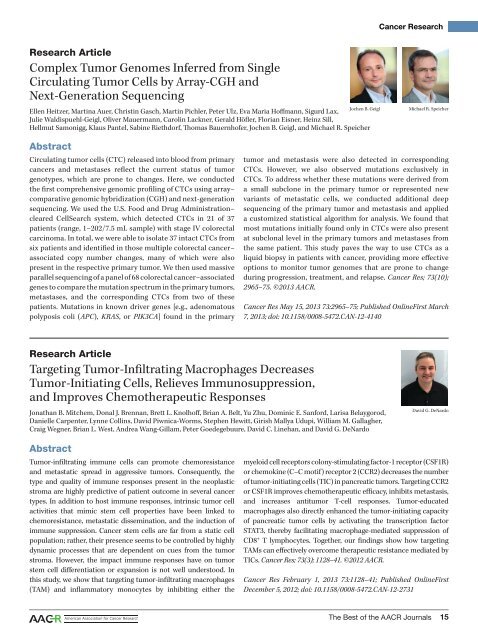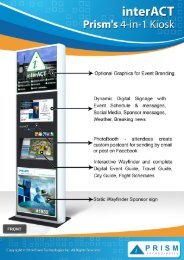Best of AACR Journals
You also want an ePaper? Increase the reach of your titles
YUMPU automatically turns print PDFs into web optimized ePapers that Google loves.
Cancer Research<br />
Research Article<br />
Complex Tumor Genomes Inferred from Single<br />
Circulating Tumor Cells by Array-CGH and<br />
Next-Generation Sequencing<br />
Jochen B. Geigl<br />
Ellen Heitzer, Martina Auer, Christin Gasch, Martin Pichler, Peter Ulz, Eva Maria H<strong>of</strong>fmann, Sigurd Lax,<br />
Julie Waldispuehl-Geigl, Oliver Mauermann, Carolin Lackner, Gerald Höfler, Florian Eisner, Heinz Sill,<br />
Hellmut Samonigg, Klaus Pantel, Sabine Riethdorf, Thomas Bauernh<strong>of</strong>er, Jochen B. Geigl, and Michael R. Speicher<br />
Michael R. Speicher<br />
Abstract<br />
Circulating tumor cells (CTC) released into blood from primary<br />
cancers and metastases reflect the current status <strong>of</strong> tumor<br />
genotypes, which are prone to changes. Here, we conducted<br />
the first comprehensive genomic pr<strong>of</strong>iling <strong>of</strong> CTCs using array–<br />
comparative genomic hybridization (CGH) and next-generation<br />
sequencing. We used the U.S. Food and Drug Administration–<br />
cleared CellSearch system, which detected CTCs in 21 <strong>of</strong> 37<br />
patients (range, 1–202/7.5 mL sample) with stage IV colorectal<br />
carcinoma. In total, we were able to isolate 37 intact CTCs from<br />
six patients and identified in those multiple colorectal cancer–<br />
associated copy number changes, many <strong>of</strong> which were also<br />
present in the respective primary tumor. We then used massive<br />
parallel sequencing <strong>of</strong> a panel <strong>of</strong> 68 colorectal cancer–associated<br />
genes to compare the mutation spectrum in the primary tumors,<br />
metastases, and the corresponding CTCs from two <strong>of</strong> these<br />
patients. Mutations in known driver genes [e.g., adenomatous<br />
polyposis coli (APC), KRAS, or PIK3CA] found in the primary<br />
tumor and metastasis were also detected in corresponding<br />
CTCs. However, we also observed mutations exclusively in<br />
CTCs. To address whether these mutations were derived from<br />
a small subclone in the primary tumor or represented new<br />
variants <strong>of</strong> metastatic cells, we conducted additional deep<br />
sequencing <strong>of</strong> the primary tumor and metastasis and applied<br />
a customized statistical algorithm for analysis. We found that<br />
most mutations initially found only in CTCs were also present<br />
at subclonal level in the primary tumors and metastases from<br />
the same patient. This study paves the way to use CTCs as a<br />
liquid biopsy in patients with cancer, providing more effective<br />
options to monitor tumor genomes that are prone to change<br />
during progression, treatment, and relapse. Cancer Res; 73(10);<br />
2965–75. ©2013 <strong>AACR</strong>.<br />
Cancer Res May 15, 2013 73:2965–75; Published OnlineFirst March<br />
7, 2013; doi: 10.1158/0008-5472.CAN-12-4140<br />
Research Article<br />
Targeting Tumor-Infiltrating Macrophages Decreases<br />
Tumor-Initiating Cells, Relieves Immunosuppression,<br />
and Improves Chemotherapeutic Responses<br />
Jonathan B. Mitchem, Donal J. Brennan, Brett L. Knolh<strong>of</strong>f, Brian A. Belt, Yu Zhu, Dominic E. Sanford, Larisa Belaygorod,<br />
Danielle Carpenter, Lynne Collins, David Piwnica-Worms, Stephen Hewitt, Girish Mallya Udupi, William M. Gallagher,<br />
Craig Wegner, Brian L. West, Andrea Wang-Gillam, Peter Goedegebuure, David C. Linehan, and David G. DeNardo<br />
David G. DeNardo<br />
Abstract<br />
Tumor-infiltrating immune cells can promote chemoresistance<br />
and metastatic spread in aggressive tumors. Consequently, the<br />
type and quality <strong>of</strong> immune responses present in the neoplastic<br />
stroma are highly predictive <strong>of</strong> patient outcome in several cancer<br />
types. In addition to host immune responses, intrinsic tumor cell<br />
activities that mimic stem cell properties have been linked to<br />
chemoresistance, metastatic dissemination, and the induction <strong>of</strong><br />
immune suppression. Cancer stem cells are far from a static cell<br />
population; rather, their presence seems to be controlled by highly<br />
dynamic processes that are dependent on cues from the tumor<br />
stroma. However, the impact immune responses have on tumor<br />
stem cell differentiation or expansion is not well understood. In<br />
this study, we show that targeting tumor-infiltrating macrophages<br />
(TAM) and inflammatory monocytes by inhibiting either the<br />
myeloid cell receptors colony-stimulating factor-1 receptor (CSF1R)<br />
or chemokine (C–C motif) receptor 2 (CCR2) decreases the number<br />
<strong>of</strong> tumor-initiating cells (TIC) in pancreatic tumors. Targeting CCR2<br />
or CSF1R improves chemotherapeutic efficacy, inhibits metastasis,<br />
and increases antitumor T-cell responses. Tumor-educated<br />
macrophages also directly enhanced the tumor-initiating capacity<br />
<strong>of</strong> pancreatic tumor cells by activating the transcription factor<br />
STAT3, thereby facilitating macrophage-mediated suppression <strong>of</strong><br />
CD8 + T lymphocytes. Together, our findings show how targeting<br />
TAMs can effectively overcome therapeutic resistance mediated by<br />
TICs. Cancer Res; 73(3); 1128–41. ©2012 <strong>AACR</strong>.<br />
Cancer Res February 1, 2013 73:1128–41; Published OnlineFirst<br />
December 5, 2012; doi: 10.1158/0008-5472.CAN-12-2731<br />
The <strong>Best</strong> <strong>of</strong> the <strong>AACR</strong> <strong>Journals</strong> 15



